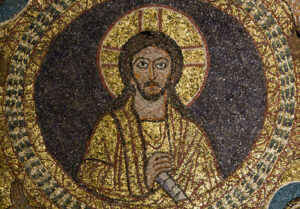This is Part 2 in our series, “The Invisible Feet of the Market,” an intersectional primer on how capitalism works. Part 1 can be found here.
This series aspires to offer a primer on capitalism from a critical standpoint, so it is useful to establish at the outset how I’m defining capitalism. Myriad definitions of capitalism have been offered, differing significantly depending on whether capitalism is being promoted, analyzed or critiqued. However, these definitions usually converge on several features (presented here in highly idealized form) that cohere in the “mainstream” definition of capitalism:
- Claims to private ownership of property are enforced by the government.
- Money (cash or credit, physical or electronic) is the universal, fungible medium for buying and selling things and for saving to buy later. (This implies a banking system and standardized accounting practices, which some scholars regard as the innovations that launched capitalism as such.)
- The market is the mechanism through which people buy and sell goods (physical objects) and services (activities people do for others).
- Prices for goods and services on the market are not set by government fiat, but by the dynamics of supply and demand.
- Some people own the materials, equipment, and delivery-systems needed to make goods and/or provide services for sale on the market. This allows them to participate in the marketdirectly.
- Those who don’t own these things are able to participate in the goods-and-services market onlyindirectly, by participating in a second market — the labor market — in which owners pay them money to make goods or provide services and they, in turn, use this money to buy goods and services. (There is a spectrum of formal-to-informal arrangements for such employment.)
Now, private property, money, and markets were all in operation long before capitalism; even when combined, they do not, in themselves, constitute capitalism. The reason the features above are called capitalism is because of the power they vest in those owners of materials, equipment, and delivery-systems — what the term capital in its most basic sense refers to — needed to make goods and provide services for sale on the market.
In capitalism, according to the mainstream definition, the owners of capital decide for themselves which products to supply to the market, rather than being told by the government (that’s feature 5). They have control over how their employees produce these products and how much employees are paid (feature 6). And they can charge whatever prices they want for their products, subject only to customers’ ability and willingness to buy at those prices (feature 4).
Those who celebrate capitalism often recast the features above as a matter of freedom for everyone: (1) People are free to do whatever they want with their private property. (2) Money frees people from having to barter. (3) People are free to buy and sell whatever they want on the market (whether it’s a legal or an illegal market). (4) Sellers are free to charge as much as buyers are willing to pay. (5) Owners have freedom over what they sell on the market and how it is produced, while (6) employees are free to choose which owner(s) they want to work for.
In actuality, however, much of this freedom is illusory, and the modicum of freedom is made possible only through deeper patterns of unfreedom. Tracing those patterns is the task of this series as a whole, but first we need to confront the shortcomings of the mainstream definition of capitalism and consider a better definition.
The biggest problem with the mainstream definition is that it treats capitalism only as an economic system, a matter of producing and trading goods and services, when in fact it is a comprehensive social order: capitalism is an attempt to organize the survival of humankind (or at least a portion thereof).
Another major problem with the mainstream definition is that it ignores capitalism’s total embeddedness within Earth’s ecological dynamics. Indeed, excluding ecology from the definition of capitalism enables its devastation of the environment. And as we’ll see in a later installment, this is one of the ways the mainstream definition obscures how certain people come to own and control capital in the first place, which is closely related to another question it leaves unanswered: why are people forced to seek employment?
So in this series I’m defining capitalism differently. The short version is that capitalism is a way of ordering society so that the human web of care exhausts the planetary web of life as both are forced to maximize the wealth owned by a small fraction of humankind. The longer version, while a bit dense, will make clear why I’ve chosen the topics I’ve chosen for later parts in the series. Here it is:
Capitalism is a way of ordering how humans relate to each other and to the rest of nature, of which humans are one part. In capitalism, a fraction of humankind has seized and maintains the power to modify the overall functioning of whole ecosystems (both those they inhabit and others). With this power, they transform — and thereby degrade — ecosystems into production systems intended to not only secure their own survival and consumption but also expand their wealth for its own sake. The survival of the other humans who inhabit those ecosystems is determined by the role(s) they perform within such wealth-expanding production systems. Thus, capitalism subordinates ecosystem functioning to human survival and subordinates both to the endless expansion of wealth owned by a fraction of humankind.
Defining capitalism in this way foregrounds three main markers that distinguish it, that make it “a thing.” First, capitalism is inherently based on inequalities of power and wealth: unequal power to modify ecosystem functioning, unequal wealth derived from it, unequal chances and means of survival, and unequal power to set the terms of one’s own survival. The very nature of capitalism is to preserve and entrench the inequalities without which it couldn’t come into existence.
Second, through capitalism, the activities of some humans don’t just have short-term impact on the environment but instead change how the environment itself functions in an ongoing way. The language of ecosystem functioning in my definition is drawn from ecological science, where it refers to the physical and biological processes by which all the living organisms inhabiting a given place and time together remain alive and draw matter and energy from the land, water, and air they inhabit, into which they’re re-incorporated after death.
Ecosystems and ecosystem functioning certainly do change over time even without human intervention. Moreover, humans can thrive in ways that align with such natural shifts in ecosystem functioning rather than induce artificial shifts. But capitalism is premised on dominating (in socially unequal ways) “nature,” which it strictly demarcates from “humans” and treats as a “free gift,” whose consent is not necessary in order to be used and exhausted.
Now, while inequality and destructive modification of ecosystem functioning are necessary markers for a social order to qualify as capitalist, they are not sufficient ones. The third hallmark is the goal that is pursued using the first two as tools: the endless of expansion of financial wealth for its own sake. This means that wealth is not accumulated only in order to be used for current or future consumption, either for survival or comfort beyond survival (or military strength to secure that comfort). Nor is it accumulated primarily in order to finance (or militarily secure) trade in goods.
There is, in fact, no “in order to” that defines the purpose of accumulating wealth in capitalism: the expansion of wealth is an end in itself, its own moral justification. Nowadays, the expansion of wealth usually goes by other names, such as “economic growth” or a “GDP increase,” which sound like abstract or universally experienced phenomena. But because a capitalist economy is built to preserve wealth inequality, its growth primarily benefits those who own most of its wealth. A rising tide may well lift all yachts, but in capitalism the vast majority are clinging to life-preservers (or at best an easily flippable raft).
It may seem strange for a series on the “invisible feet of the market” to not even mention the market in its guiding definition. But my goal is precisely to show how capitalism is not synonymous with the market. The market is a tool of capitalism, not capitalism per se; it is not an end-in-itself, but an instrument to help achieve capitalism’s fundamental aim, which is the maximal expansion of unequally owned wealth for its own sake.
At various points in the series, we will explore how the market does this, beginning in the next installment, which describes the twofold overarching structure of capitalism — whereas this one has focused on the processes that define capitalism and take place within that structure. In the next installment, I’ll also touch on how these processes unfolded gradually across many centuries, becoming the system that governs global society today.
Some further reading:
Two good starting-points for reflecting on how capitalism subordinates both human care for each other and the functioning of ecosystems are here and here.
Some snapshots of how capitalism is succeeding at what it is meant to do are here, here, and here.
And here’s an interesting contrast between the illusion of freedom under capitalism versus what real freedom could be like.
Deep dive: Raj Patel & Jason W. Moore, A History of the World in Seven Cheap Things (University of California Press, 2018; link)
Dr. Jeremy Posadas, a queer social ethicist, is the Director of Gender Studies and holds the John F. Anderson Chair of Christian Thought at Austin College (which is located nowhere near Austin but on the rural Texas-Oklahoma border). He previously worked in both congregation-based and labor organizing and is the creator of the United Regions of America map.



